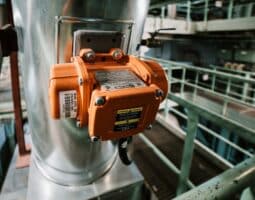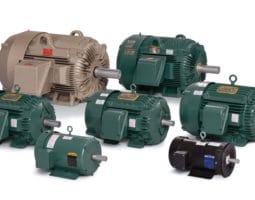An often underestimated threat to energy efficiency is the silent culprit of a leak. Due to the characteristics of leaks, the environment in which compressors operate, and the limitations of the human senses, detecting air leaks in industrial compressors can easily become a daunting task without the right equipment.
In this guide, we’ll dive into the importance of air leak detection, the workings of ultrasonic leak detection services, common leakage areas in compressors, and how partnering with Cullum & Brown can establish a robust Leak Prevention Program for your industrial air compressors.
Understanding Ultrasonic Leak Detectors
Principle of Operation
Ultrasonic leak detectors function by capturing high-frequency sound waves emitted through leaks, beyond the range of human hearing. This technology relies on the vibrations generated when gasses or liquids escape, allowing precise identification of leak locations and sizes.
Versatility
Ultrasonic leak detectors excel in versatility, adapting seamlessly to various industrial environments. Their effectiveness extends across different industries, making them valuable tools for detecting leaks in compressed air lines, steam systems, and refrigeration systems. This adaptability ensures reliable results across a broad spectrum of applications, enhancing their utility in diverse operational contexts.
Non-Intrusive Nature
A key advantage of ultrasonic leak detection lies in its non-intrusive nature, particularly beneficial for sealed systems or hard-to-reach components. Unlike traditional methods that may require equipment disassembly, ultrasonic detectors operate externally. In sealed systems like air compressors, operators can scan surfaces without dismantling, ensuring efficient leak identification without disrupting ongoing operations. This non-intrusive approach not only saves time but also minimizes the risk of introducing additional issues during the detection process, making ultrasonic detectors essential for swift and effective leak assessments.
Common Areas for Leakage
Effectively detecting air leaks in industrial air compressors hinges on an understanding of the common areas where these leaks tend to occur. Vigilance in these key problem areas is essential for maintaining the integrity and efficiency of industrial air compressor systems.
Pipelines and Joints
The connections between pipelines and joints stand out as frequent culprits for air leaks in industrial air compressors. Over time, the vibrations, fluctuations in pressure, and operational stresses on these connections can lead to loosening or deterioration. Regular inspection and proactive maintenance of these junctures are crucial for preventing air leaks that can compromise the overall performance of the compressor system.
Valves and Fittings
Valves and fittings within industrial air compressors are highly susceptible to air leaks. The nature of their function, involving opening and closing to regulate airflow, exposes them to wear and tear. Seals may degrade, and connections may become compromised, resulting in leaks. Monitoring these components, coupled with routine maintenance, is essential to mitigate the risk of air leaks and ensure the seamless operation of the compressor system.
Pressure Relief Valves
Pressure Relief valves play an important role in maintaining safe operating pressures within the system. Over time, wear and tear or calibration issues may lead to improper sealing, causing leaks. Regular inspection and testing of pressure relief valves are paramount to identifying and rectifying potential leaks before they escalate. This proactive approach not only safeguards against air leaks but also ensures the safety and reliability of the entire industrial air compressor system.
The Bottom Line of Leak Detection
Air leaks in compressors are often a result of gradual loss of performance rather than sudden failure. This subtle decline can go unnoticed without regular monitoring and the right detection tools. Leak detection is a strategic move that can significantly improve your bottom line through a variety of avenues.
Energy Efficiency and Cost Savings
- Reduced Energy Consumption: Identifying and repairing leaks in industrial systems, such as air compressors, helps in reducing energy waste.
- Lower Utility Bills: Experiencing a noticeable reduction in energy consumption translates to lower utility bills and decreased operational costs.
- Reduced Repair Costs: Early detection and timely repair reduces the need for urgent and extensive repairs or equipment replacements.
- Extended Equipment Lifespan: The prolonged lifespan of industrial equipment minimizes the frequency of capital investments in new machinery.
- Minimized Downtime: Reduced downtime means uninterrupted operations and higher productivity.
- Optimized Production: Leak detection ensures that industrial processes run smoothly, contributing to higher output.
Corporate Reputation, Safety, and Risk Mitigation
- Emission Reduction: Addressing leaks helps in minimizing emissions, and aligning with environmental sustainability goals.
- Avoiding Penalties: Proactive leak detection and adherence to emission standards can prevent such penalties and associated costs.
- Preventing Accidents: Air or gas leaks can pose safety hazards, including the risk of fire or exposure to harmful substances.
- Sustainability Practices: Demonstrating a commitment to sustainability and responsible resource management through leak detection contributes to a positive corporate image, attracting environmentally conscious customers and investors, and potentially boosting the company’s market value.
- Lower Insurance Costs: Proactive leak detection and risk mitigation measures can result in lower insurance premiums. Insurance providers often reward companies that actively manage and reduce risks associated with equipment failures or accidents.
Establishing a Leak Prevention Program with Cullum & Brown
Safeguard your industrial air compressor systems with Cullum & Brown’s tailored Leak Prevention Program, delivering customized solutions to your specific needs. Our proactive approach seamlessly integrates leak detection into your preventative maintenance plans, identifying and addressing potential air leaks before they disrupt your operations. Benefit from our expertise and reliability as we deploy advanced technologies, including ultrasonic leak detectors, to ensure accurate assessments and dependable solutions.
With a broad geographic reach covering Missouri, Montana, Wyoming, Colorado, North Dakota, South Dakota, and Nebraska, our responsive teams stand ready to secure your industrial assets. Take the proactive step today by contacting Cullum & Brown to schedule a comprehensive Leak Detection Service, ensuring the optimal performance and longevity of your industrial air compressor systems. Trust us to deliver reliable solutions tailored to your needs, safeguarding your equipment against the risks of undetected leaks.

